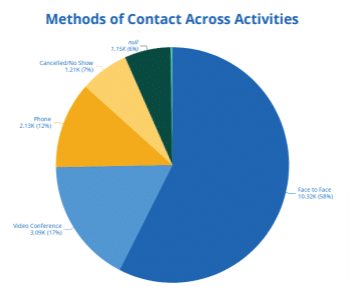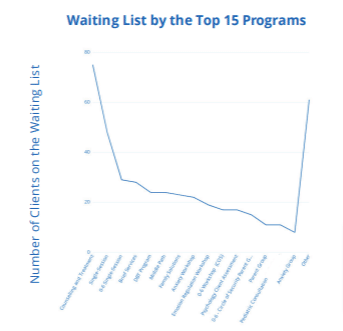Making the most out of your agency data.
Business intelligence (BI) tools and mental health software have become crucial in modern data-driven organizations, enabling decision-makers to extract and analyze big data for insights, trends, and patterns.
BI can help organizations identify inefficiencies, improve resource allocation, and optimize workflows. In the mental health setting, BI has the potential to transform the way organizations manage their operations and serve clients.
In this blog, we will explain what business intelligence is and how it can benefit mental health agencies to enhance decision-making, resource allocation, and service delivery as well as some advice on how to get started.
What is Business intelligence?
Business intelligence (BI) is a collection of strategies, processes, technologies, and applications used to collect, store, analyze and present data for the purpose of making informed decisions.
These tools allow organizations to gain more accurate and up-to-date insights into both their internal and external environment by aggregating data from multiple sources such as customer databases, financial accounts, web analytics, social media metrics, and more.
BI tools can transform raw data into actionable insights by using techniques such as predictive , natural language processing (NLP) and machine learning algorithms. Using these techniques, BI tools can generate accurate forecasts or identify key trends or correlations in data that would have been impossible to discover manually.
How Mental Health Agencies Can Benefit from BI
There’s a wealth of data now available to mental health organizations today. But staying on top of all that data can be overwhelming, especially when time and resources are scarce. BI tools offer a tremendous opportunity for mental health agencies to leverage their data in meaningful ways.
These powerful technologies provide valuable insights that quickly guide decision-making processes, allowing organizations to make more informed decisions, and ultimately support better outcomes for patients.
Let’s look at how BI benefits mental health agencies and helps them achieve their goals.
Actionable insights
One of the primary benefits of using BI tools in the mental health setting is that it provides insights into data that would otherwise remain hidden due to complexities and silos. Having access to this information enables managers to understand their agency’s strengths, challenges, and opportunities, and make data-driven decisions that improve service delivery and outcomes.
For example, agencies can use BI tools to identify where their staff spends most of their hours, which programs have the longest waiting list, and which programs need more support. By using this information, agencies can develop new programs or restructure existing ones to better meet the needs of their clients and improve their service delivery.

Improved auditing and privacy functions
BI tools can be a powerful asset in ensuring adequate privacy for clients while also streamlining auditing processes. BI tools can greatly reduce the amount of time spent on manual audits by quickly identifying any discrepancies in data management practices.
With these insights, mental health organizations can better protect their clients’ privacy by ensuring that only authorized personnel have access to sensitive information.
Ensures PHIPA compliance
BI tools can help practitioners ensure they are adhering to privacy standards and protect their clients’ confidentiality. Mental health software platforms with built-in PHIPA compliance features help practitioners manage their operations while meeting regulatory requirements.
These tools ensure that patient privacy and confidentiality standards are being maintained while also allowing staff and management to access the information they need to do their jobs. This includes data on patient demographics, treatment outcomes, and other critical information.
Funding applications and justifications
Mental health organizations need to demonstrate the impact and effectiveness of their interventions to secure funding and sustainability. And as funding becomes more competitive and difficult to secure, mental health agencies need to have data-backed insights that can demonstrate their effectiveness and show the impact of their programs on clients.
BI tools provide agencies with the data they need to make evidence-based reports and justify their funding requirements. That data can then be presented with visuals like charts and graphs that demonstrate the organization’s impact and help funders understand the value of their investments.

Streamline operations and workflows
Mental health organizations deal with complex administrative tasks, such as scheduling appointments, managing resources, and coordinating teams. BI tools are essential for mental health organizations looking to streamline their operations and workflows.
BI tools can help automate tasks, reduce administrative burden, and free up more time for practitioners to focus on clients’ needs. Additionally, BI solutions organizations can better manage administrative tasks such as billing, scheduling appointments, and collecting patient feedback—all of which can lead to improved care for patients.
Better client outcomes
Business intelligence can be instrumental in improving the outcomes of mental health clients. By leveraging data from multiple sources to make informed decisions, mental health organizations can gain valuable insights into the behavior of their clients.
These insights help organizations develop more effective treatment plans that are tailored to each individual client’s needs and preferences. With access to up-to-date information and insights into patient behavior, mental health providers are better positioned to provide effective treatments that will result in improved patient outcomes.
Enhance staff efficiency and wellbeing
BI tools can also enhance staff efficiency and wellbeing. By analyzing staff workload, managers can identify areas where staff spends most of their hours and take measures to redistribute workload or allocate more resources where necessary. This helps avoid burnout and work-related stress, which can negatively impact staff mental health and undermine service quality.
Take Your Agency to the Next Level with Quicksight BI
With ever-changing regulations, information silos, resource gaps and time constraints to navigate—it can be difficult for agencies to keep up with the technology changes that could help them better serve the community. That’s where EMHware can help.
EMHware is a comprehensive mental health software that allows organizations to manage a wide range of administrative functions, from scheduling appointments to tracking patient progress. And the integration with Quicksight BI takes agency management to the next level by providing ministry reporting functionality and community standards comparisons.
To learn more about how EMHware and Quicksight BI can help your organization run more effectively and efficiently, book a demo today.
